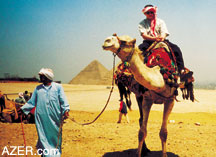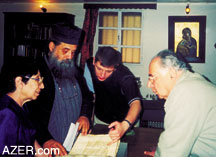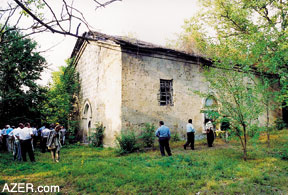|

Autumn 2003 (11.3)
Pages
58-59
Udins Today
Ancestors
of the Caucasian Albanians
by
Zurab Konanchev
Related Articles
1 Udi
Language: Compared with Ancient Albanian - Aleksidze
2 Quick Facts: Caucasian
Albanian Script - Aleksidze and Blair
3 Albanian Script:
How Its Secrets Were Revealed? - Aleksidze and Blair
4 Zaza Aleksidze. Decipherer:
Glimpses of Childhood - Blair
5 Caucasian Albanian
Script: Significance of Dechipherment - Aleksidze
6 Udins Today: Ancestors of
the Caucasian Albanians - Zurab Konanchev
7 Heyerdahl
Intrigued by Rare Caucasus Albanian Text
  Left: Zurab Konanchev. Left: Zurab Konanchev.
One
of the most fascinating aspects related to the decipherment of
the Caucasian Albanian written language is that there is a living
community today that still continues to speak this language.
Udins, who live primarily in Azerbaijan, are the descendants
of the Caucasian Albanians.
(Don't confuse Caucasian Albanians with the people and language
living in the Baltics). More than 2,000 years later, despite
the fact that their language has not been in a written form since,
at least, the 10th century, the language still is alive. We interviewed
Zurab Konanchev to learn more about the Udins of today. Zurab
is the Founder of the Albanian Research Center and Deputy Chairman
of the recently registered Albanian Udin Christian Community
of the Azerbaijani Republic.
The discovery and decipherment of the Caucasian Albanian alphabet
is an epochal event for Udins. For me, getting a chance to accompany
Georgian decipherer Zaza Aleksidze and Azerbaijani historian
Farida Mammadova this past May to St. Catherine's Monastery on
Mt. Sinai, Egypt, was an experience of a lifetime.
  Left: Author Zurab Konanchev as tourist in
Cairo in May 2003. Left: Author Zurab Konanchev as tourist in
Cairo in May 2003.
For
me, an Udin and a historian just to hold that manuscript in my
hands was like touching history. It's such a difficult feeling
to describe. Can you imagine that more than 1,500 years ago an
Albanian was sitting there writing those words? It makes you
realize that history never really disappears.
The discovery and decipherment of Caucasian Albanian is such
an important event for our people. It's only natural that we
would be excited about it. Every group on earth wants to feel
connected to their roots. Especially for us Udins, this discovery
is so important as there are not many of us left.
The latest estimate of the Udin population was 8,000 (1989);
today, some suggest the figure to be about 10,000. The majority
of Udins live in northern Azerbaijan near Gabala in two areas.
An estimated 4,000 Udins reside in the village of Nij and about
100 live in the Oghuz region. There has not been a census since
the collapse of the Soviet Union, so no one is absolutely certain
what the total Udin population is. A small number also live in
the cities of Baku and Sumgayit. There are also small groups
living in Russia, Georgia, and Uzbekistan and Kazakhstan.
Albanians in History
Caucasian Albania was a state that existed on what is now the
territory of Azerbaijan Historically, it is believed to have
existed between the 4th century B.C. and 8th century A.D. From
about the 4th century A.D. onward, Albanians adopted Christianity.
The manuscripts written in Caucasian Albanian found at Mt. Sinai
consist of an Albanian Christian Lectionary dating from about
the 5th century.
  Left: Zurab Konanchev and Dr. Farida Mammadova
(left) accompanied the decipherer Dr. Zaza Aleksidze (right)
to Mt. Sinai to St. Catherine's Orthodox Monastery to see the
Caucasian Albanian scripts. Zurab is Udi, a descendent of the
Caucasian Albanians. Left: Zurab Konanchev and Dr. Farida Mammadova
(left) accompanied the decipherer Dr. Zaza Aleksidze (right)
to Mt. Sinai to St. Catherine's Orthodox Monastery to see the
Caucasian Albanian scripts. Zurab is Udi, a descendent of the
Caucasian Albanians.
The last Albanian Catholicos up until the Arab conquest in 703
was Orthodox. However, during the Arabs rule on the territory,
the Armenian Catholicos wrote a letter to Abd-al Malik, the Arabian
khalifa attacking Albanian Orthodox beliefs and accusing Albanians
of fostering a friendship with Byzantium.
Since the Arabs did not have good relations with Byzantium, they
gave a decree that the Albanian church would be put under the
jurisdiction of the Armenian church.
Again in 1836, the Russian czar, Nicholas again put pressure
on the Udins and to come under the jurisdiction of the Armenian
Gregorian church. From that time onward, Udins stopped practicing
Christianity. In the beginning, we were told to pray in Armenian,
which we didn't understand. Then we were forbidden to visit our
own churches, and Armenian churches were built next to our churches.
As a result, some Udins accepted Islam, others became Gregorians
by marrying Armenians, especially on the territory of Karabakh.
Since Independence
Significant changes have occurred for small minority groups since
the collapse of the Soviet Union in late 1991. Now they can begin
to identify as an ethnic group, study their roots, reclaim their
history and, in the case of Udins, become reacquainted with Christian
beliefs that they once held.
Below: St. Elsey Church, an
Udi Church, in Nij which is located in the north central region
of Azerbaijan. The church is currently under repair.
  In the
early 1990s, Jora Kochari, one of the elders of the Udin community
in Nij, registered a Cultural Foundation with the government.
Since then, he has worked hard to produce numerous literary works
in the Udi language. Since Azerbaijan has adopted Latin as their
official alphabet, Udins also have based their 52-letter alphabet
on Latin as well. Such nationalistic gestures would have been
impossible during the Soviet period. In the
early 1990s, Jora Kochari, one of the elders of the Udin community
in Nij, registered a Cultural Foundation with the government.
Since then, he has worked hard to produce numerous literary works
in the Udi language. Since Azerbaijan has adopted Latin as their
official alphabet, Udins also have based their 52-letter alphabet
on Latin as well. Such nationalistic gestures would have been
impossible during the Soviet period.
In addition, these days in Udin schools, children are taught
the Udin language up through the fourth grade. Some community
members would like to see instruction extended through the eighth
grade.
Since independence, the Caucasian Albanian Research Center with
the help of Udins has organized conferences such as "The
History of the Caucasus". Zurab is proud that foreigners
are recognizing and helping them. "At our last conference
called 'Albanians in the Past and Present' that we held in May
2003, a number of scientists came from abroad. We took them to
Nij. They met with the Udin people and saw the church building
that we are trying to restore there. We introduced them to Udi
cuisine and presented them with books in the Udi language about
our folklore."
The Caucasian Research Center in conjunction with these conferences
has already published two issues of the magazine "History
of the Caucasus", and the third issue will be published
soon.
Military Service
Not long ago, the Azerbaijani government started recruiting Udins
for military service. According to Zurab, this change marks a
change in policy, signifying that Azerbaijan finally recognizes
the Udins as full-fledged citizens. The problem had been that
many Udins had adopted Armenian family names. Because of the
ongoing conflict in Nagorno-Karabakh with Armenians, the Azerbaijani
military did not want to recruit these Udins in military service,
even though military service is required of all Azerbaijani males.
It was incomprehensible to me as a citizen of Azerbaijan not
to be able to serve in the army. Every Udin must serve in the
military just like any other citizen of the Republic of Azerbaijan.
Now they're recruiting everybody," notes Zurab. "But
we're such a small group that we have to be concerned if they
recruit all our eligible young men. Imagine the hardships on
our families if 10 percent of our men were doing military service
at the same time?" The Udins are trying to make the government
aware of this problem.
Albanian Udin Christians
On May 26, 2003, a religious entity was formalized and registered
with the government called the "Albanian Udin Christian
Community of the Azerbaijan Republic". Representatives from
the major faiths in Azerbaijan participated at the presentation,
including some of the most important leaders of the Muslim, Russian
Orthodox, Mountain Jews, European Jews and Evangelical Christian
faith. Even the Bishop of the Norwegian Church, Ole D. Hagesæther,
sent the Udins a letter, congratulating them on their new status.
The Udin community is eager for the rebirth of their church.
"At present, we are not practicing Christianity," explains
Zurab. By that, he means that the economic conditions, and the
fact that they have not been practicing Christianity for the
past century are the primary inhibiting factors. It's not that
Christianity in Azerbaijan is against the law.
Azerbaijan's Constitution, adopted in 1995, protects all religions
- Islam, Christianity, Judaism and other belief systems. The
Constitution also guarantees the separation of power between
Church and State.
But the Udins are realizing that Christianity requires its own
infrastructure to support the community. The old church building
is in such disrepair that people cannot gather there to worship.
Nor do Udins have their own priests. Therefore, even the most
basic ceremonies related to weddings, baptisms and funerals are
not yet celebrated in the Church.
Young men must prepare themselves to become priests by studying
the Gospels and enrolling in seminaries. We need competent priests
who can lead our communities. Unfortunately, there are no such
people now. We need the right people. We shouldn't just pick
anybody. For a person to become a priest, he must have strong
beliefs so that he can lead.
This process will take a lot of time. We don't want to rush the
process. Then we'll need to send them to study somewhere."
Already the Russian Orthodox Church has suggested that Udins
could study at their seminaries in Stavropol or Moscow.
Udins feel the need to publish books in their language. "It's
not just enough to translate the Gospels," he says. "You
have to publish a sufficient number of copies and distribute
them."
At the turn of the 19th century, an attempt had been made to
re-establish reading in the Udi language in churches. Bezhanov,
an Udin from Oghuz, had translated the Gospels in 1898 and published
them in 1902. Of course, some of the terminology used a hundred
years ago is no longer used. But Zurab is convinced these works
can be revised. Jora Kochari has already translated the Gospels
and linguists and philologists of Caucasian languages abroad
are reviewing his translation to make sure that they adhere to
the grammatical rules of the Udi language.
So we are making progress. We haven't been able to worship in
our church from more than 160 years. So it's really a great achievement
for us to begin to restore our community and our church and to
be able to read the Gospels in our own language.
Zurab describes the many needs among the Udins - especially in
the realms of economics and educational - but they all require
money. Books need to be published. They'd like to get some computers
for their Center and connect with the Internet. They dream of
being able to offer their youth courses in computers and foreign
languages.
They also have plans to work closely with other ethnic groups
in Azerbaijan, especially the Mountain Jews who live near their
communities. They hope to work together with Udins in Georgia
and Russia in studying and documenting Udin customs.
We understand that these dreams will take a long time to realize.
Our people have survived more than two millennia, so we have
great hopes that these things will really take place, and that
our community will be strengthened by all of these things that
we are discovering about our past.
Gulnar Aydamirova
also contributed to this article.
Back to Index
AI 11.3 (Autumn 2003)
AI Home
| Search | Magazine
Choice
| Topics
| AI Store | Contact us
Other Web sites
created by Azerbaijan International
AZgallery.org | AZERI.org | HAJIBEYOV.com
|